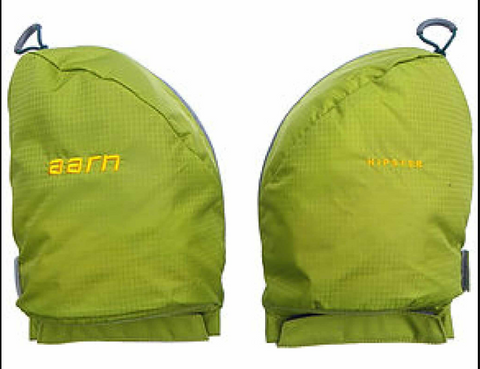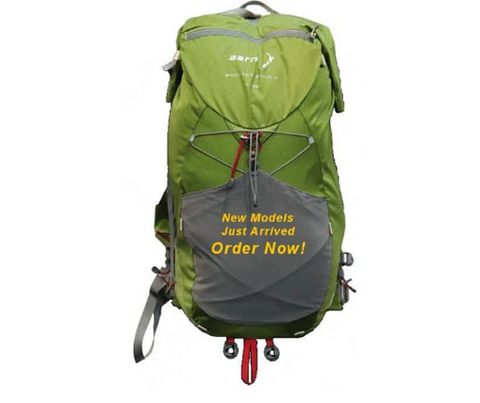In this comprehensive guide, we'll delve into ten essential steps to ensure optimal pack fitting, covering key aspects such as adjusting straps, distributing weight, and selecting the right size. By following these guidelines, you'll be well-equipped to enjoy your hiking adventures to the fullest.
Step 1: Assess Your Gear Needs
Before selecting a hiking pack, evaluate the gear you plan to carry on your adventures. Consider factors such as trip duration, weather conditions, and terrain to determine the appropriate size and capacity of your pack. For day hikes or overnight trips, a smaller pack may suffice, while longer expeditions require larger capacities to accommodate camping gear and supplies.
Step 2: Choose the Right Pack Size
Selecting the correct pack size is crucial for ensuring comfort and efficiency on the trail. Take into account your torso length, which typically ranges from 15 to 22 inches for adults, and choose a pack size accordingly. Many manufacturers offer packs in multiple sizes to accommodate various body types, so be sure to try on different sizes to find the best fit.
Step 3: Adjust Shoulder Straps
Properly adjusted shoulder straps are essential for distributing weight evenly across your shoulders and upper body. Adjust the straps to ensure a snug fit without causing discomfort or restricting movement. The straps should lie flat against your shoulders, with no gaps or slack between the straps and your body.
Step 4: Secure the Hip Belt
The hip belt plays a crucial role in supporting the weight of your pack and transferring it to your hips, reducing strain on your shoulders and back. Position the hip belt snugly around your hips, with the padded sections resting comfortably on your hip bones. Adjust the tension to achieve a secure fit, ensuring that the belt does not ride up or dig into your waist.
Step 5: Adjust the Load Lifters
Load lifters are straps located at the top of the shoulder harness that help stabilize the hiking backpack and pull the weight closer to your body. Adjust the load lifters to a 45-degree angle from the pack, creating a slight backward pull on the shoulder straps. This angle ensures that the weight is evenly distributed and prevents the pack from sagging or pulling away from your body.
Step 6: Fine-tune the Sternum Strap
The sternum strap, located across your chest, helps stabilize the shoulder straps and prevent them from slipping off your shoulders. Adjust the sternum strap to a comfortable height, typically just below your collarbone. Ensure that the strap is not too tight, as it may restrict your breathing or cause discomfort during movement.
Step 7: Check the Frame and Suspension System
Inspect the frame and suspension system of your pack to ensure proper alignment and support. Lightweight backpacking gear often features internal frames or frame sheets that provide stability and structure to the pack. Check for any signs of damage or misalignment and make adjustments as needed to maintain optimal support.
Step 8: Distribute Weight Properly
Evenly distributing weight throughout your pack is crucial for maintaining balance and stability on the trail. Place heavier items closer to your back and near the center of the pack to minimize strain on your shoulders and back. Use compression straps to secure the load and prevent shifting during movement.
Step 9: Test the Fit
Once you've adjusted all the straps and loaded your pack with gear, take the time to test the fit on a short hike or walk around your neighborhood. Pay attention to any areas of discomfort or pressure points, and make further adjustments as needed to achieve a comfortable fit. Remember that proper pack fitting may require some trial and error, so be patient and persistent in finding the perfect fit.
Step 10: Reevaluate and Readjust as Needed
As you gain more experience with your pack and embark on different hiking adventures, periodically reevaluate the fit and make adjustments as needed. Your body may change over time, or you may encounter new challenges on the trail that require modifications to your pack setup. By staying attuned to your body and your gear, you'll ensure a comfortable and efficient hiking experience for years to come.
Benefits of Proper Hiking Pack Fitting
Properly fitting your hiking pack offers numerous benefits that enhance your overall hiking experience and ensure optimal comfort and performance on the trail. A well-fitted pack not only boosts your comfort but also optimizes your performance on the trail, allowing you to tackle even the most challenging terrains with ease and confidence.

From minimizing discomfort and fatigue to improving weight distribution and stability, the advantages of a properly fitting hiking pack are invaluable. So, take time to ensure your pack fits perfectly to make all the difference in your enjoyment and success on the trail. Here's how investing time in pack fitting can elevate your hiking adventures:
Comfort and Ergonomics: A well-fitted hiking pack distributes weight evenly across your body, reducing strain on your shoulders, back, and hips. This ergonomic design minimizes discomfort and fatigue, allowing you to hike longer distances with ease. Opting for ultralight backpacks with adjustable straps, such as the Aarn Featherlite Freedom backpack, ensures a custom fit tailored to your body's unique contours.

Efficient Load Distribution: Properly adjusted straps, hip belts, and load lifters ensure that the weight of your pack is evenly distributed, optimizing balance and stability on the trail. By centralizing the load and minimizing bulk, lightweight backpacking gear enhances your agility and maneuverability, allowing for smoother and more efficient hiking.
Prevention of Injuries: Ill-fitting packs can lead to discomfort, chafing, and even injuries such as back pain, muscle strains, and blisters. Investing in high-quality hiking gear online, such as the Couloir ski packs, with adjustable features and ergonomic designs, reduces the risk of common hiking ailments and allows you to focus on enjoying the journey without worrying about discomfort or injury.
Enhanced Mobility and Flexibility: A properly fitted hiking pack moves with your body, allowing for natural movement and flexibility while hiking. This unrestricted mobility enables you to navigate challenging terrain, scramble over rocks, and maneuver through narrow trails with confidence and ease. Lightweight backpacking gear, such as daypacks for hiking, offers the versatility and freedom of movement necessary for dynamic outdoor adventures.

Improved Posture and Balance: A well-fitted pack promotes proper posture and body alignment, reducing the likelihood of fatigue and strain on your muscles and joints. By maintaining a balanced load and distributing weight effectively, ergonomic hiking packs help you maintain stability and equilibrium, especially on uneven or rugged terrain.
Customized Comfort: Every hiker is unique, and finding the right pack fit is essential for personalized comfort and support. Lightweight backpacking gear, such as Alpine ski packs, offers a range of sizes and adjustable features to accommodate various body types and preferences. Customizing your pack fit ensures maximum comfort and enjoyment during long hikes and multi-day treks.
Long-term Durability: Properly fitting your hiking pack not only enhances immediate comfort and performance but also contributes to the long-term durability and longevity of your gear. By minimizing wear and tear on straps, buckles, and suspension systems, a well-fitted pack maintains its structural integrity and functionality over time, ensuring reliable performance on countless adventures.

Confidence and Enjoyment: Finally, a well-fitted hiking pack instills confidence and peace of mind, allowing you to focus on the scenery, wildlife, and camaraderie of the trail rather than discomfort or gear-related issues. With the assurance of a comfortable and efficient pack fit, you can fully immerse yourself in the beauty and serenity of the outdoors, creating memorable experiences that last a lifetime.
Gear up for your next outdoor adventure with Light Hiking Gear! Explore our wide range of ultralight backpacks, including the Aarn Active Endeavour backpack and the Couloir Ascent ski pack, designed to enhance your hiking, skiing, and camping experiences.
Find the perfect lightweight backpacking gear and daypacks for hiking online, ensuring comfort and efficiency on every trek. Don't miss out on our premium-quality Alpine ski packs and Couloir ski packs, crafted for peak performance in the mountains. Shop now and elevate your outdoor adventures with Light Hiking Gear!




0 comments